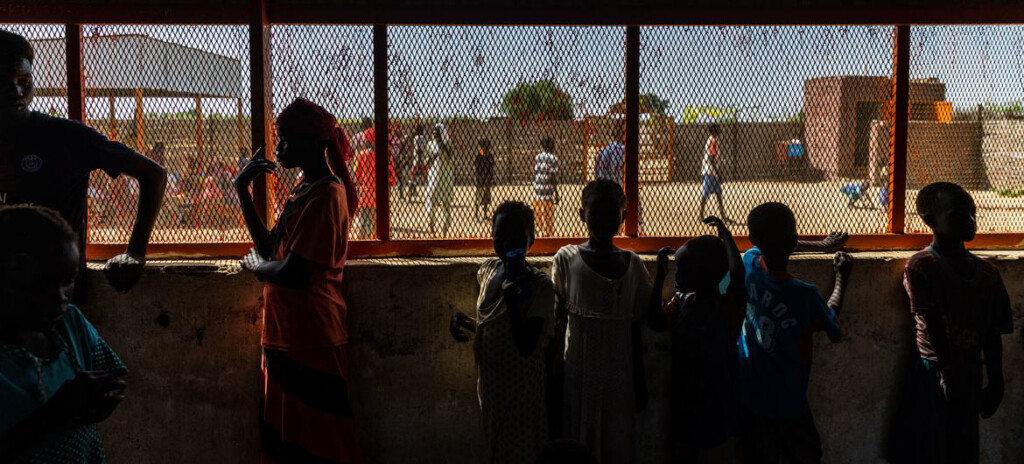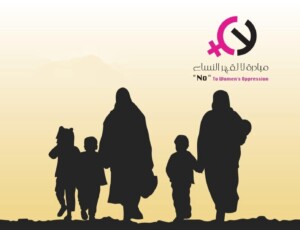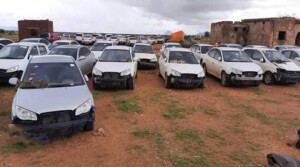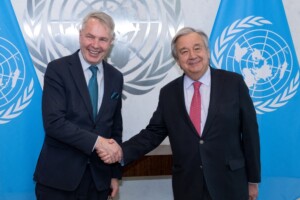UN expert warns of child recruitment by armed groups in Sudan

A child-friendly space at a camp in South Darfur (File photo: Adriana Zehbrauskas / UNICEF)
An independent UN human rights expert on Monday expressed concern about the increased risk of recruitment and use of children by armed forces and armed groups in Sudan, as the months-long war between rival militaries continues.
The UN expert today expressed concern about the increased risk of recruitment and use of children by armed forces and armed groups since the outbreak of conflict in Sudan between the Rapid Support Forces (RSF) and the Sudanese Armed Forces (SAF) earlier this year.
“Unaccompanied children and children from poor families are allegedly targeted by RSF in the outskirts of Khartoum, as well as in Darfur and West Kordofan, for recruitment into combat roles,” said Siobhán Mullally*, the UN Special Rapporteur on trafficking in persons, especially women and children.
Girls abducted
Girls have also reportedly been abducted from Khartoum to Darfur for sexual exploitation, including sexual slavery. “The deteriorating humanitarian situation and lack of access to food and other basic services make children, especially unaccompanied and separated children on the streets, easy targets for recruitment by armed groups,” Mullally said.
Responding to claims that children may join armed groups as a survival strategy, the Special Rapporteur recalled that the consent of a child (defined as any person under the age of 18) is legally irrelevant and that it is unnecessary to prove the use of force. “The recruitment of children by armed groups for any form of exploitation – including in combat roles – is a gross violation of human rights, a serious crime and a violation of international humanitarian law,” she said.
The expert expressed concern about allegations of a failure to facilitate humanitarian access to children and respect the work of all humanitarian agencies and their humanitarian partners. A recent update on the situation in Sudan by the Global Protection Cluster reported that 72 humanitarian offices and assets had been attacked or looted and 19 humanitarian workers had been killed as of October 2023.
Mullally called on all parties to the conflict to return to peace talks and reach a comprehensive ceasefire agreement that would allow for the safe delivery of humanitarian assistance and ensure accountability for alleged violations.
“Urgent action is needed to address these pressing concerns and take effective measures to prevent child trafficking and provide effective protection to child victims and children at risk, in particular displaced, unaccompanied and separated children, refugee children and children with disabilities,” the Special Rapporteur said.
The expert has been in contact with both the RSF and Sudanese authorities.
‘Ugly reality’
In August, the Darfur Bar Association reported instances of child soldiers fighting for both parties of the conflict. Youth for Darfur organisation accused the paramilitary Rapid Support Forces (RSF) of enlisting minors as soldiers, denouncing the alleged practice.
According to a source of prominent Sudan researcher and analyst Eric Reeves, “an ugly reality has started to emerge. Among the dead, there were many children killed fighting with the RSF,” most of whom are reportedly from neighbourhoods in Khartoum mainly inhabited by populations from marginalised regions of Sudan, including Darfur and Blue Nile region.
The RSF used “money” and “false promises” to recruit the children, some of whom are as young as 14, according to the source.
The Sudan War Monitor published a video in which a group of boys is shown operating a combat vehicle in the area.
Deep impact
A 2017 report by the UN Secretary-General details the deep impact of armed conflict on children in Sudan. It is the first report on children and armed conflict in the country published since the secession of South Sudan, and since the start of hostilities in South Kordofan and Blue Nile states.
The UN verified the killing and maiming of close to 1,300 children, with a majority of child casualties (971) documented in Darfur. In all regions, hostilities between the Government and armed groups, including aerial bombardments, were the cause of the majority of child deaths and injuries from 2011 to 2016. Unexploded ordnance of war causing child casualties was another concern.
“Child recruitment and use declined during the period covered by the report,” declared Leila Zerrougui, Special Representative of the Secretary-General for Children and Armed Conflict. “However, boys and girls continued to be victims of grave violations committed by all parties to the conflict, including killing and maiming, sexual violence, and attacks on schools and hospitals.”
The UN confirmed at the time that at least 372 children were victims of rape and sexual violence in Darfur. In most cases, children were raped by mostly unidentified perpetrators during attacks on their villages or while collecting wood or water in the vicinity of camps for displaced people.
*Siobhán Mullally (Ireland) was appointed as Special Rapporteur on trafficking in persons, especially women and children by the UN Human Rights Council in July 2020, to promote the prevention of trafficking in persons in all its forms, and to encourage measures to uphold and protect the human rights of victims. She is also the Established Professor of Human Rights Law and Director of the Irish Centre for Human Rights at the School of Law, University of Galway. Prior to her appointment as Special Rapporteur, she was a member of the Council of Europe Group of Experts on Action against Trafficking in Human Beings (GRETA), elected as President of GRETA from 2016-2018 and as 1st Vice-President from 2014-2018.
The Special Rapporteurs are part of what is known as the Special Procedures of the Human Rights Council. Special Procedures, the largest body of independent experts in the UN Human Rights system, is the general name of the Council’s independent fact-finding and monitoring mechanisms that address either specific country situations or thematic issues in all parts of the world. Special Procedures’ experts work on a voluntary basis; they are not UN staff and do not receive a salary for their work. They are independent from any government or organisation and serve in their individual capacity.











 and then
and then